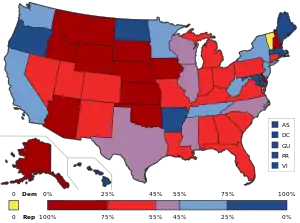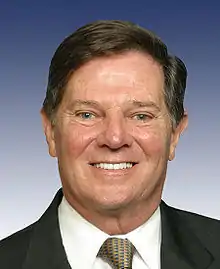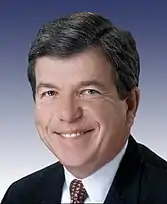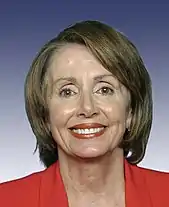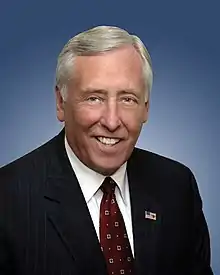| 108th United States Congress | |
|---|---|
107th ← → 109th | |
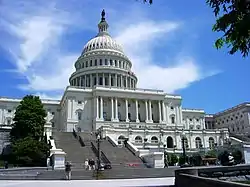 United States Capitol (2004) | |
January 3, 2003 – January 3, 2005 | |
| Members | 100 senators 435 representatives 5 non-voting delegates |
| Senate majority | Republican |
| Senate President | Dick Cheney (R) |
| House majority | Republican |
| House Speaker | Dennis Hastert (R) |
| Sessions | |
| 1st: January 7, 2003 – December 8, 2003 2nd: January 20, 2004 – December 9, 2004 | |
The 108th United States Congress was a meeting of the legislative branch of the United States federal government, composed of the United States Senate and the United States House of Representatives from January 3, 2003, to January 3, 2005, during the third and fourth years of George W. Bush's presidency.
House members were elected in the 2002 general election on November 5, 2002. Senators were elected in three classes in the 1998 general election on November 3, 1998, 2000 general election on November 7, 2000, or 2002 general election on November 5, 2002. The apportionment of seats in the House of Representatives was based on the 2000 United States census.
This is the most recent Congress to have a Democratic senator from South Carolina, Fritz Hollings, who retired at the end of the Congress.
Both chambers had a Republican majority, with the Republicans slightly increasing their edge in the House, and regaining control of the Senate, after party control had switched back and forth during the 107th Congress due to various factors. With President Bush, this gave the Republicans an overall federal government trifecta.
Major events
- February 1, 2003: Space Shuttle Columbia disintegrated during reentry
- March 20, 2003: 2003 invasion of Iraq began
- April 14, 2003: Human Genome Project was completed
- July 14, 2003: CIA leak scandal began
- May 17, 2004: Same-sex marriage began in Massachusetts
- July 22, 2004: 9/11 Commission issued an initial report of its findings
- September 13, 2004: expiration of the Federal Assault Weapons Ban
- November 2, 2004:
- 2004 United States presidential election: George W. Bush defeated Democratic challenger, Senator John Kerry from Massachusetts.
- United States Senate elections, 2004 & United States House of Representatives elections, 2004: Republicans increased their majorities in both houses.
Major legislation
Enacted
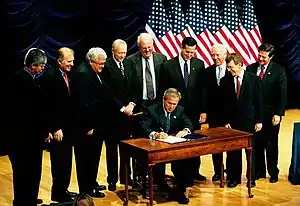
- March 11, 2003: Do-Not-Call Implementation Act of 2003, Pub. L. 108–10 (text) (PDF)
- April 25, 2003: Clean Diamond Trade Act, Pub.L. 108-19
- April 30, 2003: PROTECT (Prosecutorial Remedies and Other Tools to end the Exploitation of Children Today) Act, including Illicit Drug Anti-Proliferation Act, Pub. L. 108–21 (text) (PDF)
- May 27, 2003: United States Leadership Against HIV/AIDS, Tuberculosis, and Malaria Act of 2003, Pub.L. 108-25
- May 28, 2003: Jobs and Growth Tax Relief Reconciliation Act of 2003, Pub. L. 108–27 (text) (PDF)
- May 29, 2003: Veterans' Memorial Preservation and Recognition Act of 2003, Pub.L. 108-29
- June 25, 2003: Keeping Children and Families Safe Act of 2003, Pub.L. 108-36
- September 4, 2003: Prison Rape Elimination Act of 2003, Pub. L. 108–79 (text) (PDF)
- October 1, 2003: Department of Homeland Security Appropriations Act, 2004, Pub.L. 108-90
- October 28, 2003: Check 21 Act, Pub. L. 108–100 (text) (PDF)
- November 5, 2003: Partial-Birth Abortion Ban Act, Pub. L. 108–105 (text) (PDF)
- December 3, 2003: Healthy Forests Restoration Act of 2003, Pub.L. 108-148
- December 3, 2003: 21st Century Nanotechnology Research and Development Act, Pub.L. 108-153
- December 4, 2003: Fair and Accurate Credit Transactions Act, Pub. L. 108–159 (text) (PDF)
- December 6, 2003: Fairness to Contact Lens Consumers Act, Pub.L. 108-164
- December 8, 2003: Medicare Prescription Drug, Improvement, and Modernization Act, Pub. L. 108–173 (text) (PDF)
- December 12, 2003:Syria Accountability and Lebanese Sovereignty Restoration Act, Pub. L. 108–175 (text) (PDF)
- December 16, 2003: CAN-SPAM Act, Pub. L. 108–187 (text) (PDF)
- March 25, 2004: Unborn Victims of Violence Act (Laci and Conner's Law), Pub. L. 108–212 (text) (PDF)
- June 30, 2004: Bunning-Bereuter-Blumenauer Flood Insurance Reform Act, Pub. L. 108–264 (text) (PDF)
- July 7, 2004: GAO Human Capital Reform Act of 2004, Pub. L. 108–271 (text) (PDF)
- July 21, 2004: Project BioShield Act of 2004, Pub. L. 108–276 (text) (PDF)
- October 18, 2004: North Korean Human Rights Act of 2004, Pub. L. 108–333 (text) (PDF)
- October 18, 2004: Department of Homeland Security Appropriations Act, 2005, Pub.L. 108-334
- October 20, 2004: Belarus Democracy Act of 2004, Pub. L. 108–347 (text) (PDF)
- October 22, 2004: American Jobs Creation Act of 2004, Pub.L. 108-357
- October 30, 2004: Crime Victims' Rights Act, Pub.L. 108-405
- December 3, 2004: Internet Tax Nondiscrimination Act, Pub.L. 108-435
- December 3, 2004: Individuals with Disabilities Education Improvement Act of 2004, Pub.L. 108-446
- December 8, 2004: Consolidated Appropriations Act, 2005, Pub.L. 108-447
- December 10, 2004: Alaska Land Transfer Acceleration Act, Pub.L. 108-452
- December 17, 2004: Intelligence Reform and Terrorism Prevention Act, Pub. L. 108–458 (text) (PDF)
Proposed, but not enacted
Party summary
Senate
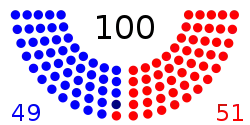
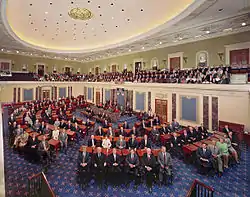
The party summary for the Senate remained the same during the entire 108th Congress.
| Party (shading shows control) |
Total | Vacant | ||||
|---|---|---|---|---|---|---|
| Democratic (D) |
Independent (I) | Republican (R) | Other | |||
| End of previous congress | 48 | 1 | 50 | 1 | 100 | 0 |
| Begin | 48 | 1 | 51 | 0 | 100 | 0 |
| End | ||||||
| Final voting share | 48.0% | 1.0% | 51.0% | 0.0% | ||
| Beginning of next congress | 44 | 1 | 55 | 0 | 100 | 0 |
House of Representatives
Due to resignations and special elections, Republicans lost a net of two seats to the Democrats. All seats were filled though special elections. (See Changes in membership, below.)
| Affiliation | Party (Shading indicates majority caucus) |
Total | |||
|---|---|---|---|---|---|
| Democratic (D) |
Independent (I) |
Republican (R) |
Vacant | ||
| End of previous Congress | 209 | 1 | 223 | 433 | 2 |
| Begin | 204 | 1 | 229 | 434 | 1 |
| May 31, 2003 | 228 | 434 | 1 | ||
| June 5, 2003 | 205 | 229 | 435 | 0 | |
| December 9, 2003 | 228 | 434 | 1 | ||
| January 20, 2004 | 227 | 433 | 2 | ||
| February 17, 2004 | 228 | 434 | 1 | ||
| June 1, 2004 | 207 | 228 | 435 | 0 | |
| June 9, 2004 | 206 | 434 | 1 | ||
| July 20, 2004 | 229 | 435 | 0 | ||
| August 31, 2004 | 205 | 228 | 434 | 1 | |
| September 23, 2004 | 204 | 227 | 432 | 3 | |
| Final voting share | 48.0% | 52.0% | |||
| Non-voting members | 4 | 0 | 1 | 5 | 0 |
| Beginning of next Congress | 201 | 1 | 232 | 434 | 1 |
Leadership
Senate
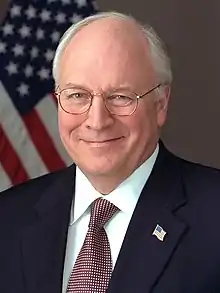
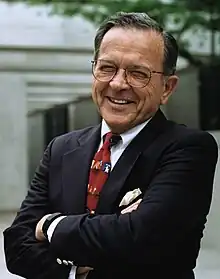
- President: Dick Cheney (R)
- President pro tempore: Ted Stevens (R)
Majority (Republican) leadership
Minority (Democratic) leadership
House of Representatives
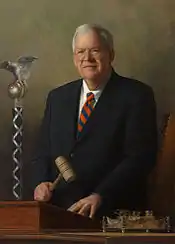
- Speaker: Dennis Hastert (R)
Majority (Republican) leadership
- Majority Leader: Tom DeLay
- Majority Whip: Roy Blunt
- Chief Deputy Whip: Eric Cantor
- Republican Conference Chairman: Deborah Pryce
- Republican Conference Vice-Chairman: Jack Kingston
- Republican Conference Secretary: John T. Doolittle
- Policy Committee Chairman: Christopher Cox
- Republican Campaign Committee Chairman: Tom Reynolds
- House Rules Committee Chairman: David Dreier
Minority (Democratic) leadership
- Minority Leader: Nancy Pelosi
- Minority Whip: Steny Hoyer
- Senior Chief Deputy Minority Whip: John Lewis
- Democratic Caucus Chairman: Bob Menendez
- Democratic Caucus Vice Chairman: Jim Clyburn
- Democratic Campaign Committee Chairman: Bob Matsui
- Chief Deputy Minority Whips: Joe Crowley, Baron Hill, Ron Kind, Ed Pastor, Max Sandlin, Jan Schakowsky, & Maxine Waters
Members
Senate
The Senators are preceded by the class, In this Congress, Class 3 meant their term ended with this Congress, requiring reelection in 2004; Class 1 meant their term began in the last Congress, requiring reelection in 2006; and Class 2 meant their term began in this Congress, requiring reelection in 2008.
House of Representatives
The Members of the House of Representatives are preceded by the district number.
Changes in membership
Members who came and left during this Congress.
Senate
There were no changes in Senate membership during this Congress.
House of Representatives
| District | Vacated by | Reason for change | Successor | Date of successor's formal installation[lower-alpha 1] |
|---|---|---|---|---|
| Hawaii 2nd | Ed Case (D) | Member-elect Patsy Mink (D) died September 28, 2002, but was posthumously elected to the 108th Congress. Ed Case had won a special election for the seat in the 107th Congress November 30, 2002, but not for the 108th Congress. A special election was held January 4, 2003. |
Ed Case (D) | January 4, 2003 |
| Texas 19th | Larry Combest (R) | Resigned May 31, 2003, for personal reasons. A special election was held June 3, 2003. |
Randy Neugebauer (R) | June 5, 2003 |
| Texas 4th | Ralph Hall (D) | Changed political parties, with no interruption in his service. | Ralph Hall (R) | January 5, 2004 |
| Kentucky 6th | Ernie Fletcher (R) | Resigned December 9, 2003, to become Governor of Kentucky. A special election was held February 17, 2004 |
Ben Chandler (D) | February 17, 2004 |
| South Dakota at-large | Bill Janklow (R) | Resigned January 20, 2004, because of a December 2003 felony conviction in relation to a traffic accident. A special election was held June 1, 2004. |
Stephanie Herseth (D) | June 1, 2004 |
| North Carolina 1st | Frank Ballance (D) | Resigned June 9, 2004, as a result of health problems. A special election was held July 20, 2004 |
G. K. Butterfield (D) | July 20, 2004 |
| Louisiana 5th | Rodney Alexander (D) | Switched parties August 9, 2004 | Rodney Alexander (R) | August 9, 2004 |
| Nebraska 1st | Doug Bereuter (R) | Resigned August 31, 2004, to head the Asia Foundation. | Remained vacant until the next Congress. | |
| Florida 14th | Porter Goss (R) | Resigned September 23, 2004, to head the CIA. | Remained vacant until the next Congress. | |
| California 5th | Bob Matsui (D) | Died January 1, 2005 | Remained vacant until the next Congress. | |
Committees
Lists of committees and their party leaders for members of the House and Senate committees can be found through the Official Congressional Directory at the bottom of this article. The directory after the pages of terms of service lists committees of the Senate, House (Standing with Subcommittees, Select and Special) and Joint and, after that, House/Senate committee assignments. On the committees section of the House and Senate in the Official Congressional Directory, the committee's members on the first row on the left side shows the chairman of the committee and on the right side shows the ranking member of the committee.
Senate
- Aging (Special) (Larry E. Craig, Chair; John Breaux, Vice Chair)
- Agriculture, Nutrition and Forestry (Thad Cochran, Chair; Tom Harkin, Ranking Member)
- Forestry, Conservation and Rural Revitalization (Mike Crapo, Chair; Blanche Lincoln, Ranking Member)
- Marketing, Inspection and Product Promotion (Jim Talent, Chair; Max Baucus, Ranking Member)
- Production and Price Competitiveness (Elizabeth Dole, Chair; Kent Conrad, Ranking Member)
- Research, Nutrition and General Legislation (Peter Fitzgerald, Chair; Patrick Leahy, Ranking Member)
- Appropriations (Ted Stevens, Chair; Robert C. Byrd, Ranking Member)
- Agriculture, Rural Development and Related Agencies (Robert F. Bennett, Chair; Herb Kohl, Ranking Member)
- Commerce, Justice, State and the Judiciary (Judd Gregg, Chair; Ernest F. Hollings, Ranking Member)
- Defense (Ted Stevens, Chair; Daniel K. Inouye, Ranking Member)
- District of Columbia (Mike DeWine, Chair; Mary Landrieu, Ranking Member)
- Energy and Water Development (Pete Domenici, Chair; Harry Reid, Ranking Member)
- Foreign Operations (Mitch McConnell, Chair; Patrick Leahy, Ranking Member)
- Homeland Security (Thad Cochran, Chair; Robert C. Byrd, Ranking Member)
- Interior (Conrad Burns, Chair; Byron Dorgan, Ranking Member)
- Labor, Health, Human Services and Education (Arlen Specter, Chair; Tom Harkin, Ranking Member)
- Legislative Branch (Ben Nighthorse Campbell, Chair; Richard J. Durbin, Ranking Member)
- Military Construction (Kay Bailey Hutchison, Chair; Dianne Feinstein, Ranking Member)
- Transportation/Treasury and General Government (Richard Shelby, Chair; Patty Murray, Ranking Member)
- VA, HUD and Independent Agencies (Kit Bond, Chair; Barbara A. Mikulski, Ranking Member)
- Armed Services (John Warner, Chair; Carl Levin, Ranking Member)
- Airland (Jeff Sessions, Chair; Joe Lieberman, Ranking Member)
- Emerging Threats and Capabilities (Pat Roberts, Chair; Jack Reed, Ranking Member)
- Personnel (Saxby Chambliss, Chair; Ben Nelson, Ranking Member)
- Readiness and Management Support (John Ensign, Chair; Daniel Akaka, Ranking Member)
- Seapower (Jim Talent, Chair; Edward M. Kennedy, Ranking Member)
- Strategic Forces (Wayne Allard, Chair; Bill Nelson, Ranking Member)
- Banking, Housing and Urban Affairs (Richard Shelby, Chair; Paul Sarbanes, Ranking Member)
- Economic Policy (Jim Bunning, Chair; Chuck Schumer, Ranking Member)
- Financial Institutions (Robert F. Bennett, Chair; Tim Johnson, Ranking Member)
- Housing and Transportation (Wayne Allard, Chair; Jack Reed, Ranking Member)
- International Trade and Finance (Chuck Hagel, Chair; Evan Bayh, Ranking Member)
- Securities and Investment (Mike Enzi, Chair; Chris Dodd, Ranking Member)
- Budget (Don Nickles, Chair; Kent Conrad, Ranking Member)
- Commerce, Science and Transportation (John McCain, Chair; Ernest F. Hollings, Ranking Member)
- Aviation (Trent Lott, Chair; Ernest F. Hollings, Ranking Member)
- Communications (Conrad Burns, Chair; Ernest F. Hollings, Ranking Member)
- Competition, Foreign Commerce and Infrastructure (Gordon Smith, Chair; Byron L. Dorgan, Ranking Member)
- Consumer Affairs and Product Safety (Peter Fitzgerald, Chair; Ron Wyden, Ranking Member)
- Oceans, Fisheries and Coast Guard (Olympia J. Snowe, Chair; Ernest F. Hollings, Ranking Member)
- Science, Technology and Space (Sam Brownback, Chair; John Breaux, Ranking Member)
- Surface Transportation and Merchant Marine (Kay Bailey Hutchison, Chair; Daniel Inouye, Ranking Member)
- Energy and Natural Resources (Pete Domenici, Chair; Jeff Bingaman, Ranking Member)
- Energy (Lamar Alexander, Chair; Bob Graham, Ranking Member)
- National Parks (Craig Thomas, Chair; Daniel Akaka, Ranking Member)
- Public Lands and Forests (Larry E. Craig, Chair; Ron Wyden, Ranking Member)
- Water and Power (Lisa Murkowski, Chair; Byron Dorgan, Ranking Member)
- Environment and Public Works (Jim Inhofe, Chair; Jim Jeffords, Ranking Member)
- Clean Air, Wetlands, Private Property and Nuclear Safety (George Voinovich, Chair; Tom Carper, Ranking Member)
- Fisheries, Wildlife, and Drinking Water (Mike Crapo, Chair; Bob Graham, Ranking Member)
- Superfund and Waste Management (Lincoln Chafee, Chair; Barbara Boxer, Ranking Member)
- Transportation and Infrastructure (Kit Bond, Chair; Harry Reid, Ranking Member)
- Ethics (Select) (George V. Voinovich, Chair; Harry Reid, Vice Chair)
- Finance (Chuck Grassley, Chair; Max Baucus, Ranking Member)
- Health Care (Jon Kyl, Chair; John D. Rockefeller IV, Ranking Member)
- International Trade (Craig Thomas, Chair; Max Baucus, Ranking Member)
- Long-Term Growth and Debt Reduction (Gordon H. Smith, Chair; Bob Graham, Ranking Member)
- Social Security and Family Policy (Rick Santorum, Chair; John B. Breaux, Ranking Member)
- Taxation and IRS Oversight (Don Nickles, Chair; Kent Conrad, Ranking Member)
- Foreign Relations (Richard Lugar, Chair; Joe Biden, Ranking Member)
- African Affairs (Lamar Alexander, Chair; Russ Feingold, Ranking Member)
- East Asian and Pacific Affairs (Sam Brownback, Chair; John Kerry, Ranking Member)
- European Affairs (George Allen, Chair; Joe Biden, Ranking Member)
- International Economic Policy, Export and Trade Promotion (Chuck Hagel, Chair; Paul Sarbanes, Ranking Member)
- International Operations and Terrorism (John E. Sununu, Chair; Bill Nelson, Ranking Member)
- Near Eastern and South Asian Affairs (Lincoln Chafee, Chair; Barbara Boxer, Ranking Member)
- Western Hemisphere, Peace Corps, and Narcotics Affairs (Norm Coleman, Chair; Chris Dodd, Vice Chair)
- Governmental Affairs (Susan M. Collins, Chair; Joe Lieberman, Ranking Member)
- Oversight of Government Management, the Federal Workforce and the District of Columbia (George V. Voinovich, Chair; Richard Durbin, Ranking Member)
- Financial Management, the Budget and International Security (Peter G. Fitzgerald, Chair; Daniel Akaka, Ranking Member)
- Permanent Subcommittee on Investigations (Norm Coleman, Chair; Carl Levin, Ranking Member)
- Indian Affairs (Select) (Ben Nighthorse Campbell, Chair; Daniel K. Inouye, Vice Chair)
- Intelligence (Select) (Pat Roberts, Chair; John D. Rockefeller IV, Vice Chair)
- Health, Education, Labor and Pensions (Judd Gregg, Chair; Edward M. Kennedy, Ranking Member)
- Children and Families (Lamar Alexander, Chair; Chris Dodd, Ranking Member)
- Substance Abuse and Mental Health Services (Mike DeWine, Chair; Edward Kennedy, Ranking Member)
- Aging (Kit Bond, Chair; Barbara A. Mikulski, Ranking Member)
- Employment, Safety and Training (Mike Enzi, Chair; Patty Murray, Ranking Member)
- Judiciary (Orrin G. Hatch, Chair; Patrick Leahy, Ranking Member)
- Administrative Oversight and the Courts (Jeff Sessions, Chair; Chuck Schumer, Ranking Member)
- Antitrust, Competition Policy and Consumer Rights (Mike DeWine, Chair; Edward M. Kennedy, Ranking Member)
- Constitution, Civil Rights and Property Rights (John Cornyn, Chair; Russ Feingold, Ranking Member)
- Crime, Corrections and Victims' Rights (Lindsey Graham, Chair; Joe Biden, Ranking Member)
- Immigration, Border Security and Citizenship (Saxby Chambliss, Chair; Edward M. Kennedy, Ranking Member)
- Terrorism, Technology and Homeland Security (Jon Kyl, Chair; Dianne Feinstein, Ranking Member)
- Rules and Administration (Trent Lott, Chair; Chris Dodd, Ranking Member)
- Small Business and Entrepreneurship (Olympia J. Snowe, Chair; John Kerry, Ranking Member)
- Veterans' Affairs (Arlen Specter, Chair; Bob Graham, Ranking Member)
House of Representatives
- Agriculture (Bob Goodlatte, Chair; John Boehner, Vice Chair)
- Conservation, Credit and Rural Development (Frank D. Lucas, Chair; Tom Osborne, Vice Chair)
- Department Operations, Oversight, Nutrition and Forestry (Gil Gutknecht, Chair; Dennis Rehberg, Vice Chair)
- General Farm Commodities and Risk Management (Jerry Moran, Chair; Nick Smith, Vice Chair)
- Livestock and Horticulture (Robin Hayes, Chair; Doug Ose, Vice Chair)
- Specialty Crops and Foreign Agriculture Programs (William L. Jenkins, Chair; Terry Everett, Vice Chair)
- Appropriations (Bill Young, Chair; Dave Obey, Ranking Member)
- Agriculture, Rural Development, Food and Drug Administration and Related Agencies (Henry Bonilla, Chair; Marcy Kaptur, Ranking Member)
- Commerce, Justice, State and the Judiciary (Frank R. Wolf, Chair; Jose E. Serrano, Ranking Member)
- Defense (Jerry Lewis, Chair; John Murtha, Ranking Member)
- District of Columbia (Rodney P. Frelinghuysen, Chair; Chaka Fattah, Ranking Member)
- Energy and Water Development (David L. Hobson, Chair; Pete Visclosky, Ranking Member)
- Foreign Operations, Export Financing and Related Programs (Jim Kolbe, Chair; Nita Lowey, Ranking Member)
- Homeland Security (Hal Rogers, Chair; Martin Olav Sabo, Ranking Member)
- Interior (Charles H. Taylor, Chair; Norm Dicks, Ranking Member)
- Legislative (Jack Kingston, Chair; Jim Moran, Ranking Member)
- Military Construction (Joe Knollenberg, Chair; Chet Edwards, Ranking Member)
- Transportation, Treasury and Independent Agencies (Ernest J. Istook Jr., Chair; John Olver, Ranking Member)
- VA, HUD and Independent Agencies (James T. Walsh, Chair; Alan Mollohan, Ranking Member)
- Armed Services (Duncan Hunter, Chair; Ike Skelton, Ranking Member)
- Projection Forces (Roscoe G. Bartlett, Chair; Gene Taylor, Ranking Member)
- Readiness (Joel Hefley, Chair; Solomon P. Ortiz, Ranking Member)
- Strategic Forces (Terry Everett, Chair; Silvestre Reyes, Ranking Member)
- Tactical Air and Land Forces (Curt Weldon, Chair; Neil Abercrombie, Ranking Member)
- Terrorism, Unconventional Threats and Capabilities (Jim Saxton, Chair; Marty Meehan, Ranking Member)
- Total Force (John M. McHugh, Chair; Vic Snyder, Ranking Member)
- Budget (Jim Nussle, Chair; John M. Spratt Jr., Ranking Member)
- Education and the Workforce (John Boehner, Chair; George Miller, Ranking Member)
- Education Reform (Michael Castle, Chair; Lynn Woolsey, Ranking Member)
- Employer-Employee Relations (Sam Johnson, Chair; Robert E. Andrews, Ranking Member)
- Select Education (Peter Hoekstra, Chair; Ruben Hinojosa, Ranking Member)
- Workforce Protections (Charlie Norwood, Chair; Major Owens, Ranking Member)
- 21st Century Competitiveness (Buck McKeon, Chair; Dale Kildee, Ranking Member)
- Energy and Commerce (Billy Tauzin, Chair; Richard Burr, Vice Chair)
- Commerce, Trade and Consumer Protection (Cliff Stearns, Chair; John B. Shadegg, Vice Chair)
- Energy and Air Quality (Joe Barton, Chair; John Shimkus, Vice Chair)
- Environment and Hazardous Materials (Paul E. Gillmor, Chair; Vito Fossella, Vice Chair)
- Health (Michael Bilirakis, Chair; Charlie Norwood, Vice Chair)
- Oversight and Investigations (James C. Greenwood, Chair; Greg Walden, Vice Chair)
- Telecommunications and the Internet (Fred Upton, Chair; Cliff Stearns, Vice Chair)
- Financial Services (Mike Oxley, Chair; Barney Frank, Ranking Member)
- Capital Markets, Insurance and Government-Sponsored Enterprises (Richard H. Baker, Chair; Paul Kanjorski, Ranking Member)
- Domestic and International Monetary Policy, Trade and Technology (Peter T. King, Chair; Carolyn Maloney, Ranking Member)
- Financial Institutions and Consumer Credit (Spencer Bachus, Chair; Bernie Sanders, Ranking Member)
- Housing and Community Opportunity (Bob Ney, Chair; Maxine Waters, Ranking Member)
- Oversight and Investigations (Sue W. Kelly, Chair; Luis Guiterrez, Ranking Member)
- Government Reform (Thomas Davis, Chair; Henry Waxman, Ranking Member)
- Civil Service and Agency Organization (Jo Ann Davis, Chair; Danny K. Davis, Ranking Member)
- Criminal Justice, Drug Policy and Human Resources (Mark Souder, Chair; Elijah E. Cummings, Ranking Member)
- Energy Policy, Natural Resources and Regulatory Affairs (Doug Ose, Chair; John Tierney, Ranking Member)
- Government Efficiency and Financial Management (Todd R. Platts, Chair; Edolphus Towns, Ranking Member)
- Human Rights and Wellness (Dan Burton, Chair; Diane Watson, Ranking Member)
- National Security, Emerging Threats and International Relations (Christopher Shays, Chair; Dennis J. Kucinich, Ranking Member)
- Technology, Information Policy, Intergovernmental Relations and the Census (Adam Putnam, Chair; William Lacy Clay, Ranking Member)
- House Administration (Bob Ney, Chair; John B. Larson, Ranking Member)
- International Relations (Henry J. Hyde, Chair; Tom Lantos, Ranking Member)
- Africa (Ed Royce, Chair; Donald Payne, Ranking Member)
- Asia and the Pacific (Jim Leach, Chair; Eni Faleomavaega, Ranking Member)
- Europe (Doug Bereuter, Chair; Robert Wexler, Ranking Member)
- International Terrorism, Nonproliferation and Human Rights (Elton Gallegly, Chair; Brad Sherman, Ranking Member)
- The Middle East and Central Asia (Ileana Ros-Lehtinen, Chair; Gary Ackerman, Ranking Member)
- The Western Hemisphere (Cass Ballenger, Chair; Robert Menendez, Ranking Member)
- Judiciary (Jim Sensenbrenner, Chair; John Conyers, Ranking Member)
- Commercial and Administrative Law (Chris Cannon, Chair; Mel Watt, Ranking Member)
- The Constitution (Steve Chabot, Chair; Jerrold Nadler, Ranking Member)
- Courts, The Internet and Intellectual Property (Lamar S. Smith, Chair; Howard Berman, Ranking Member)
- Crime, Terrorism and Homeland Security (Howard Coble, Chair; Bobby Scott, Ranking Member)
- Immigration, Border Security and Claims (John Hostettler, Chair; Sheila Jackson Lee, Ranking Member)
- Resources (Richard Pombo, Chair; Jim Gibbons, Vice Chair)
- Energy and Mineral Resources (Barbara Cubin, Chair; Ron Kind, Ranking Member)
- Fisheries Conservation, Wildlife and Oceans (Wayne T. Gilchrest, Chair; Frank Pallone Jr., Ranking Member)
- Forests and Forest Health (Scott McInnis, Chair; Jay Inslee, Ranking Member)
- National Parks, Recreation and Public Lands (George P. Radanovich, Chair; Donna Christian-Christensen, Ranking Member)
- Water and Power (Ken Calvert, Chair; Grace Napolitano, Ranking Member)
- Rules (David Dreier, Chair; Porter Goss, Vice Chair)
- The Legislative Process (Deborah Pryce, Chair; Lincoln Diaz-Balart, Vice Chair)
- Technology and the House (John Linder, Chair; Sue W. Myrick, Vice Chair)
- Science (Sherwood Boehlert, Chair; Ralph M. Hall, Ranking Member)
- Energy (Judy Biggert, Chair; Nick Lampson, Ranking Member)
- Environment, Technology and Standards (Vernon Ehlers, Chair; Mark Udall, Ranking Member)
- Research (Nick Smith, Chair; Eddie Bernice Johnson, Ranking Member)
- Space and Aeronautics (Dana Rohrabacher, Chair; Bart Gordon, Ranking Member)
- Small Business (Donald A. Manzullo, Chair; Nydia Velazquez, Ranking Member)
- Regulatory Reform and Oversight (Edward L. Schrock, Chair; Charles A. Gonzalez, Ranking Member)
- Rural Enterprises, Agriculture and Technology (Sam Graves, Chair; Frank Ballance, Ranking Member)
- Tax, Finance and Exports (Patrick J. Toomey, Chair; Juanita Millender-McDonald, Ranking Member)
- Workforce, Empowerment and Government Programs (W. Todd Akin, Chair; Tom Udall, Ranking Member)
- Standards of Official Conduct (Joel Hefley, Chair; Alan B. Mollohan, Ranking Member)
- Transportation and Infrastructure (Don Young, Chair; Jim Oberstar, Ranking Member)
- Aviation (John Mica, Chair; Peter A. DeFazio, Ranking Member)
- Coast Guard and Maritime Transportation (Frank A. LoBiondo, Chair; Bob Filner, Ranking Member)
- Economic Development, Public Buildings and Emergency Management (Steve LaTourette, Chair; Eleanor Holmes Norton, Ranking Member)
- Highways, Transit and Pipelines (Tom Petri, Chair; Bill Lipinski, Ranking Member)
- Railroads (Jack Quinn, Chair; Corrine Brown, Ranking Member)
- Water Resources and Environment (John J. Duncan Jr., Chair; Jerry F. Costello, Ranking Member)
- Veterans' Affairs (Chris Smith, Chair; Lane Evans, Ranking Member)
- Benefits (Henry E. Brown Jr., Chair; Michael Michaud, Ranking Member)
- Health (Rob Simmons, Chair; Ciro Rodriguez, Ranking Member)
- Oversight and Investigations (Steve Buyer, Chair; Darlene Hooley, Ranking Member)
- Ways and Means (Bill Thomas, Chair; Charles Rangel, Ranking Member)
- Health (Nancy Johnson, Chair; Pete Stark, Ranking Member)
- Human Resources (Wally Herger, Chair; Ben Cardin, Ranking Member)
- Oversight (Amo Houghton, Chair; Earl Pomeroy, Ranking Member)
- Select Revenue Measures (Jim McCrery, Chair; Michael McNulty, Ranking Member)
- Social Security (E. Clay Shaw Jr., Chair; Bob Matsui, Ranking Member)
- Trade (Phil Crane, Chair; Sander Levin, Ranking Member)
- Whole
Joint committees
- Economic (Sen. Robert F. Bennett, Chair; Rep. Jim Saxton, Vice Chair)
- Taxation (Rep. Bill Thomas, Chair; Sen. Chuck Grassley, Vice Chair)
- The Library (Sen. Ted Stevens, Chair; Rep. Vernon J. Ehlers, Vice Chair)
- Printing (Rep. Bob Ney, Chair; Sen. Saxby Chambliss, Vice Chair)
Caucuses
Employees
Legislative branch agency directors
- Architect of the Capitol: Alan M. Hantman
- Attending Physician of the United States Congress: John F. Eisold
- Comptroller General of the United States: David M. Walker
- Director of the Congressional Budget Office: Barry B. Anderson, until February 5, 2003
- Douglas Holtz-Eakin, from February 5, 2003
- Librarian of Congress: James H. Billington
- Public Printer of the United States: Bruce James
Senate
- Chaplain: Lloyd John Ogilvie (Presbyterian), until March 15, 2003
- Barry C. Black (Seventh-day Adventist), from July 7, 2003
- Curator: Diane K. Skvarla
- Historian: Richard A. Baker
- Parliamentarian: Alan S. Frumin
- Secretary: Emily J. Reynolds
- Librarian: Greg Harness
- Secretary for the Majority: David J. Schiappa
- Secretary for the Minority: Martin P. Paone
- Sergeant at Arms: Alfonso E. Lenhardt, until March 17, 2003
- William H. Pickle, from March 17, 2003
House of Representatives
Employees include:[lower-alpha 2]
- Chaplain: Daniel P. Coughlin (Roman Catholic)
- Chief Administrative Officer: James M. Eagen III
- Clerk: Jeff Trandahl
- Inspector General: Steven McNamara
- Parliamentarian: Charles W. Johnson III, until May 31, 2004
- John V. Sullivan, from May 31, 2004
- Reading Clerks: Mary Kevin Niland (Democratic); Paul Hays (Republican)
- Sergeant at Arms: Wilson Livingood
See also
Elections
- 2002 United States elections (elections leading to this Congress)
- 2004 United States elections (elections during this Congress, leading to the next Congress)
Membership lists
Notes
- ↑ When seated or oath administered, not necessarily when service began.
- ↑ See also: Rules of the House: "Other officers and officials"
References
- ↑ The Democratic-Farmer-Labor Party (DFL) is affiliated with the United States Democratic Party.
External links
- Biographical Directory of the U.S. Congress
- Congress.gov
- History, Art and Archives from the United States House of Representatives
- Statistics & Lists from the United States Senate
- United States 108th Congress Web Archive from the U.S. Library of Congress
- "Videos of House of Representatives Sessions for the 108th Congress from www.C-SPAN.org".
- "Videos of Senate Sessions for the 108th Congress from www.C-SPAN.org".
- House of Representatives Session Calendar for the 108th Congress from www.C-SPAN.org (PDF).
- "Videos of Committees from the House and Senate for the 108th Congress".
- Senate Session Calendar for the 108th Congress (PDF).
- Congressional Pictorial Directory for the 108th Congress. S. PRT. 1967.
- "Official Congressional Directory for the 108th Congress". Congressional Directory. 1991/1992- : S. Pub. 1887.
- Official Congressional Directory for the 108th Congress (1st Revision) (PDF).
- Official Congressional Directory for the 108th Congress (2nd Revision) (PDF).
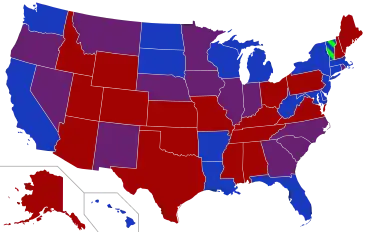

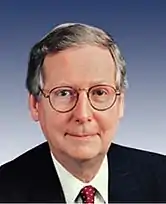

.jpg.webp)
